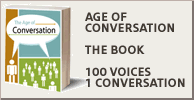
Creatives then have the huge task of narrowing their thinking down to something meaningful and strategic. You see this a lot with students with their challenges and projects, even at places that supposedly teach planning; the two disciplines sit at opposite end of the table and the strategists often have to force their way into the conversation.
Quite simply, a brief is not mandated and neither and the the creative work is rarely accountable.
Refreshingly, Steve Portigal, the king of design strategy, has made a move in the right direction.
Teaming up with Core 77 and 826 Valencia he's contributed a ton of research thinking to the challenge of imagining The Future of Reading. It's not simply a data dump, they've translated their findings into something close to a real brief with lots of juicy information to feast on.
BRIEF:
What will reading look in the future? Will we be using printed books, rectangular electronic devices, embedded technologies?This competition challenges designers to envision a rich future digital reading experience, based on a defined set of design research.
Recently, Portigal Consulting undertook an exploratory research project on reading, books, and digital reading devices, entitled Reading Ahead. Here's what they found:
- Books are more than just pages with words and pictures; they are imbued with personal history, future aspirations, and signifiers of identity
- The unabridged reading experience includes crucial events that take place before and after the elemental moments of eyes-looking-at-words
- Digital reading privileges access to content while neglecting other essential aspects of this complete reading experience
- There are opportunities to enhance digital reading by replicating, referencing, and replacing social (and other) aspects of traditional book reading
And here's what they suggest for your design explorations:
- Include the sensual
- Support the social side of reading
- Consider the varied modes and rituals of reading
- Develop an ecosystem
Posted by Ed Cotton
Powells, a bookstore in Portland, has an ounce of the financial muscle of Borders, Amazon or Barnes and Noble, but ten times the creative firepower.
The store understands that for the book store to remain relevant they have to take on a thought leadership position.
This manifests itself with the store's film series, "Out of the Book Films", where staff members make short, finely-crafted documentaries about the books they love.
Posted by Ed Cotton
Project info can be found here.
Formats/Prices:
Hardbacks $29.99
Paperbacks $16.95
Here's the list of authors- with a bunch of strategists/planners in the mix including- Emily Reed, David Armano, Mark Earls, Gareth Kay and Faris Yakob.
Gavin Heaton
Drew McLellan
CK
Valeria Maltoni
Emily Reed
Katie Chatfield
Greg Verdino
Mack Collier
Lewis Green
Sacrum
Ann Handley
Mike Sansone
Paul McEnany
Roger von Oech
Anna Farmery
David Armano
Bob Glaza
Mark Goren
Matt Dickman
Scott Monty
Richard Huntington
Cam Beck
David Reich
Mindblob (Luc)
Sean Howard
Tim Jackson
Patrick Schaber
Roberta Rosenberg
Uwe Hook
Tony D. Clark
Todd Andrlik
Toby Bloomberg
Steve Woodruff
Steve Bannister
Steve Roesler
Stanley Johnson
Spike Jones
Nathan Snell
Simon Payn
Ryan Rasmussen
Ron Shevlin
Roger Anderson
Bob Hruzek
Rishi Desai
Phil Gerbyshak
Peter Corbett
Pete Deutschman
Nick Rice
Nick Wright
Michael Morton
Mark Earls
Mark Blair
Mario Vellandi
Lori Magno
Kristin Gorski
Kris Hoet
Kofl Annan
Kimberly Dawn Wells
Karl Long
Julie Fleischer
Jordan Behan
John La Grou
Joe Raasch
Jim Kukral
Jessica Hagy
Janet Green
Jamey Shiels
Dr. Graham Hill
Gia Facchini
Geert Desager
Gaurav Mishra
Gary Schoeniger
Gareth Kay
Faris Yakob
Emily Clasper
Ed Cotton
Dustin Jacobsen
Tom Clifford
David Polinchock
David Koopmans
David Brazeal
David Berkowitz
Carolyn Manning
Craig Wilson
Cord Silverstein
Connie Reece
Colin McKay
Chris Newlan
Chris Corrigan
Cedric Giorgi
Brian Reich
Becky Carroll
Arun Rajagopal
Andy Nulman
Amy Jussel
AJ James
Kim Klaver
Sandy Renshaw
Susan Bird
Ryan Barrett
Troy Worman
S. Neil Vineberg
C.B. Whittemore
Posted by Ed Cotton
Kent Nichols of AAN will be a speaker at the Influx Ideas 07 conference in October.
Miranda is best known for an independent film she wrote and directed, released in 2005, called “Me and You and Everyone I Know.”
She has now written a book of stories and is promoting it on a website she clearly designed herself in Flash. It looks as if she has never designed a website before and that’s the beauty of it.
Human, honest, funny, real and lacking any of the predictable conventions or rules, it makes for a refreshingly different experience.
Expect to see this style everywhere by December.
Both these stories suggest that it’s easy to get fat and lazy; either you borrow someone else’s innovation, take it into a new category call it your own, hoping people will respond or you continue to milk the same franchise until time runs out.
The problem with both these initiatives is that they lack fundamental foresight.
Surely, execs at Bloomsbury must have been aware that not having any Harry Potter books to publish would result in profit and revenue declines.
Influx would have loved to be in the meeting with the fireplace manufacturer where the embedded iPod was given the go ahead.
Did anyone question it?
How did they justify it- everyone’s doing it- so we should?
In the end, this is all about timing.
Had the fireplace manufacturer come up with the idea two years back; there’s a slight possibility it would not have been ridiculed.
Had Bloomsbury started thinking about acquisitions and finding the next Harry Potter, three years ago, things might have been different.
The time to look for the next new thing is right after you had your first success.
You shouldn’t wait till problems strike to innovate.
Innovation is not just a way out of a problem; it’s a continuous process to ensure that you don’t get into trouble in the first place.
The secret is to never to stop and you don't get so drunk on success that you press “pause” on the innovation engine.
